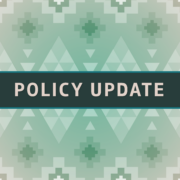NCUIH Submits Comments to CMS with Recommendations on Native American Access to Medicaid Services
On July 3, 2023, the National Council of Urban Indian Health (NCUIH) submitted written comments and recommendations to the Centers for Medicare and Medicaid Services (CMS) Administrator, Chiquita Brooks-LaSure, in response to the May 2, 2023, request for comment on the CMS proposed rule regarding ensuring access to Medicaid services (CMS–2442–P). NCUIH urged CMS to specifically consider how the proposed sections will advance the Nation’s efforts to fulfill its trust responsibility to provide services to maintain and improve the health of American Indians and Alaska Natives (AI/ANs).
NCUIH recommended that CMS take the following actions:
In its comments, NCUIH recommended that CMS ensure AI/AN representation on each state Medicaid Advisory Committee (MAC) and Beneficiary Advisory Group (BAG), ensure the rule does not impose additional burdensome reporting requirements on providers, engage with the Tribal Technical Advisory Committee (TTAG) to consider regulations or guidance to enforce the state consultation and confer requirements, and support 100% Federal Medical Assistance Percentage (FMAP) for Medicaid services provided at urban Indian organizations (UIOs) to ensure AI/AN Medicaid beneficiaries receive appropriate, quality culturally competent care. By extending this funding mechanism to cover all Medicaid services provided at UIOs, CMS can make substantial progress in reducing the existing barriers to healthcare access faced by urban Native populations.
Background on the Proposed Rule Ensuring Access to Medicaid Services (CMS–2442–P):
The proposed rule, Ensuring Access to Medicaid Services, includes both proposed changes to current requirements and newly proposed requirements that would advance CMS’s efforts to improve access to care, quality, and health outcomes, and better promote health equity for Medicaid beneficiaries across fee-for-service (FFS) and managed care delivery systems, including for home and community-based services provided through those delivery systems. These proposed requirements are intended to increase transparency and accountability, standardize data and monitoring, and create opportunities for states to promote active beneficiary engagement in their Medicaid programs.
Background on Medicaid and AI/ANs:
AI/AN people depend upon Medicaid to receive their healthcare coverage and services. In 2020, over 1.8 million AI/ANs were enrolled in Medicaid. According to a NCUIH analysis of American Community Survey (ACS) data, in 2019 Medicaid covered 1.3 million urban AI/ANs, including 30% of urban AI/AN adults under the age of 65. Medicaid and CHIP are important programs for addressing the significant disparities in insurance coverage which exist for AI/AN people. For example, according to the Urban Institute, AI/AN children were uninsured at a rate of 8.9% in 2019, the highest rate for any ethnic group in the country. AI/AN parents were uninsured at a rate of 18.7% in 2019, the second highest rate in the country. The Urban Institute reported that in 2019, AI/AN children remained more than twice as likely as white children to be uninsured and AI/AN were more than 2.5 times more likely to be uninsured than with white parents.
Medicaid is also an important source of funding for to support the operation of the Indian Health system, including UIOs who help serve the approximately 70% of AI/AN people who live in urban areas. Medicaid remains the largest secondary source of funding for UIO clinics. In 2020, 33% of the total population served at UIOs were Medicaid beneficiaries, and 35% of the AI/AN population served at UIOs were Medicaid beneficiaries. As the Kaiser Family Foundation noted in 2017, “Medicaid funds are not subject to annual appropriation limits . . . since Medicaid claims are processed throughout the year, facilities receive Medicaid funding on an ongoing basis for covered services provided to AIANs.” Because the Medicaid program receives Mandatory appropriations, Medicaid revenue is particularly essential for Indian health providers when IHS funding is reduced or interrupted by budgetary disagreements.







Leave a Reply
Want to join the discussion?Feel free to contribute!